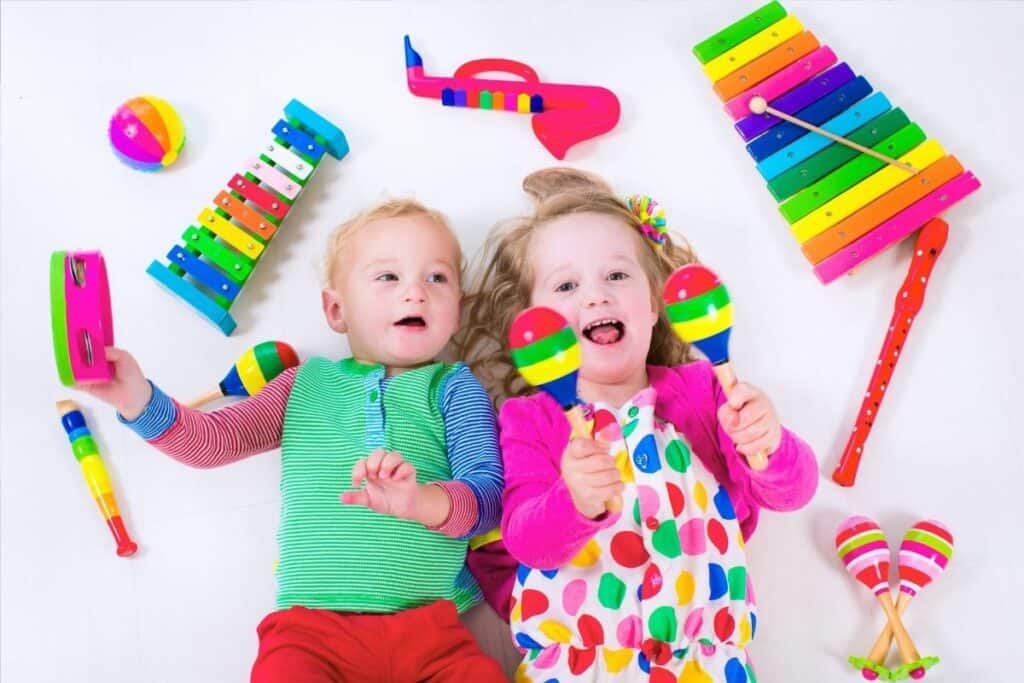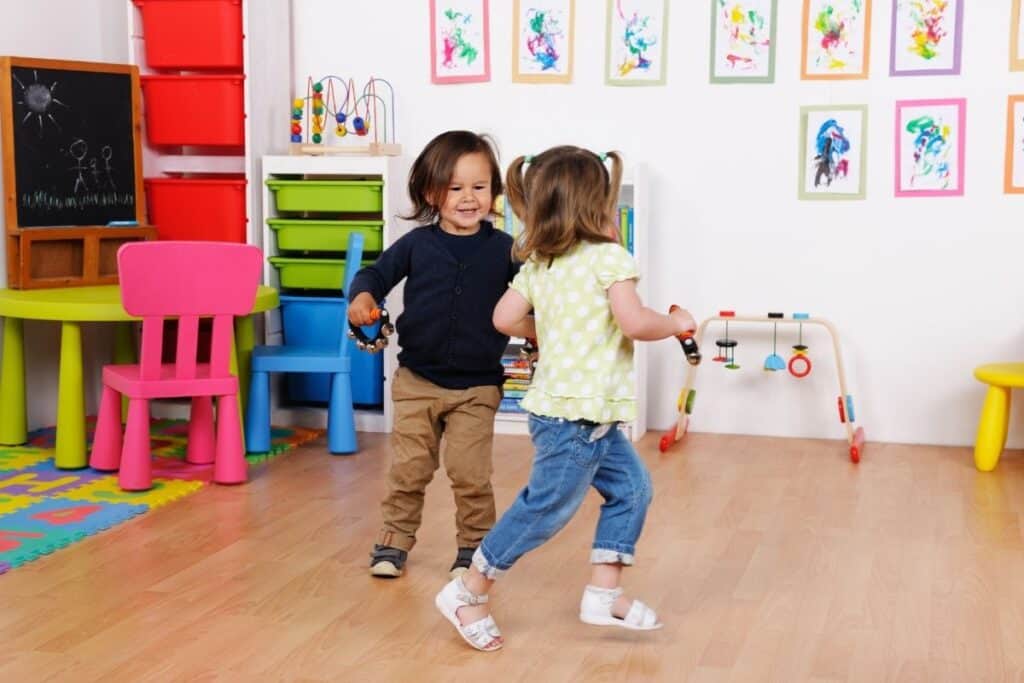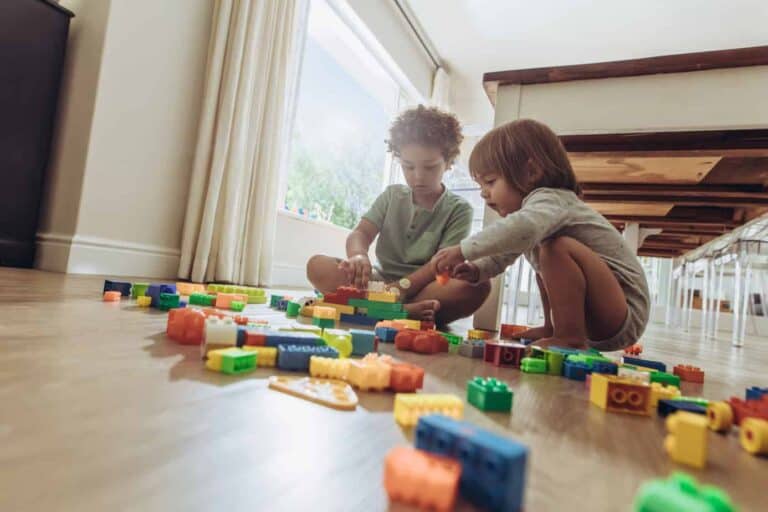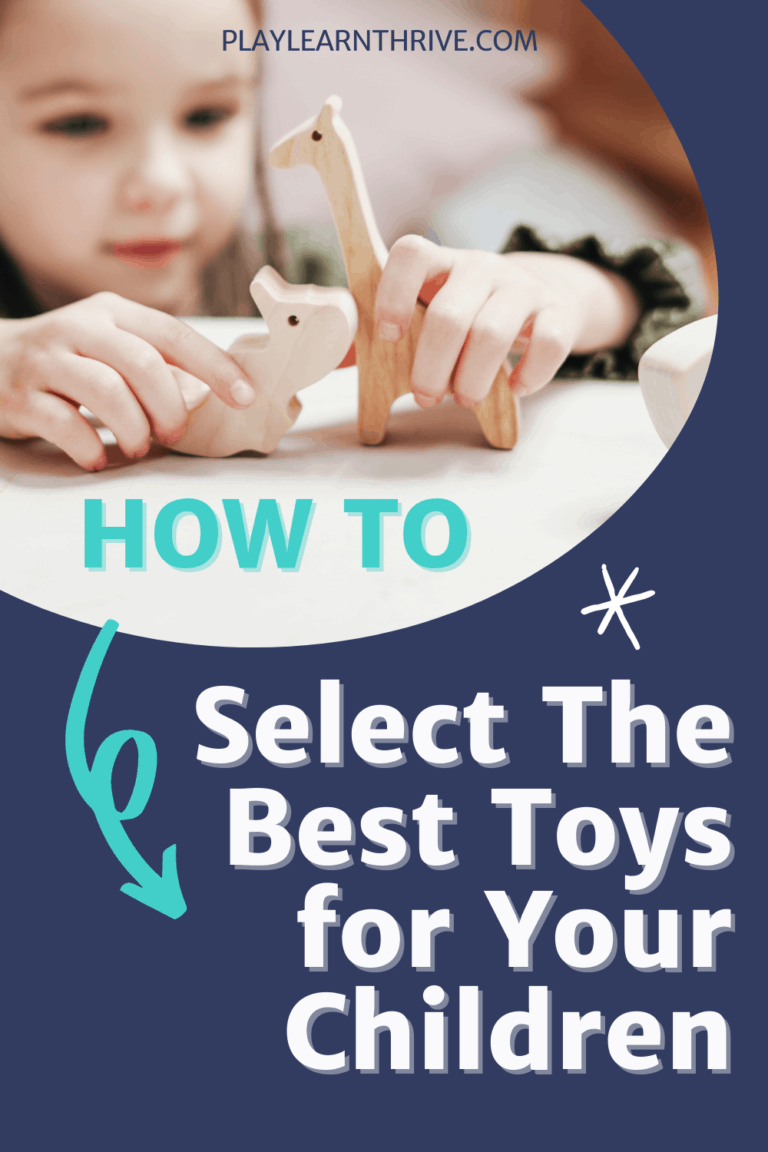11 Music and Movement Activities for Infants and Toddlers
Years ago there was the Mozart effect, and today, tons of research findings support the fact that music can support development in infants and toddlers in more ways than one. The simple act of singing a lullaby to your baby or putting on a song to move to can offer many benefits for your baby, which also includes strengthening the bond between you two.
Play. Learn. Thrive.™ only endorses products we authentically love and use. Some of the product links in this post may be affiliate links. That means that if you click them and make a purchase, this site makes a commission. Play. Learn. Thrive.™ is also an Amazon Associate. As an Amazon Associate, we earn from qualifying purchases. It will have no impact on the price you pay or the experience of your purchase.
Curious about how to take it further? Keep reading to discover some of the best music and movement activities for infants and toddlers and practically everything you need to know about exposing your child to these important sensory experiences!
How Does Music Benefit in Early Childhood?
Music has been a part of us from the beginning and has influenced us a lot, whether we acknowledge it or not. In our early childhood years, music stimulates the senses and has positive a positive effect on our social and cognitive skills. Studies have also demonstrated that children who participate in group musical activities tend to score higher on listening comprehension tests compared with those who do not. It was also found that young children who were exposed to music developed higher test scores in language, basic math, and visual-motor performances.
In fact, studies have also revealed that infants who had musical experiences displayed higher IQs throughout the first three years of life compared with their non-musical counterparts.
Music can be introduced early on through activities such as singing songs, playing instruments, or dancing and when this happens, the brain forms neural connections which aid in future development. These neural pathways help children to interpret sound patterns that are then utilized in education and social activities. Musical interaction also supports a young child's emotional intelligence by helping them develop an ear for different sounds and developing a greater understanding of speech.
Musical experiences in the early years of life have also been found to help with reading, learning new languages, math, and developing problem-solving abilities.
Singing songs to babies can aid in establishing connections between concepts like words and objects through repetition. Repetition is especially helpful when introducing children to new information or skills. Furthermore, musical activities help young children retain information better than visual presentations alone.
While it is clear that there are numerous benefits to music, the manner in which children acquire musical skills is also very important. Singing songs and playing instruments must be introduced as early as possible for a child's brain to develop best.

What Do Toddlers Learn From Music and Movement?
Toddlers can also benefit a lot from music and movement activities. These activities can help boost receptive language skills, fine motor skills, play and creativity abilities, self-regulation, concentration, socialization, physiological regulation, problem-solving skills, spatial awareness, and all the necessary skills and areas for toddlers to gain confidence in before beginning school.
Exposure to music was also found to increase motivation for other learning activities and offer benefits for not just those with learning differences but provide a positive influence on all children who are exposed to it from an early age.
How Does Music Support Learning Outcomes?
There are tons of studies that have shown that music can positively impact the academic performance of learners in a number of ways. Some of the benefits of introducing music at an early age in life include an increased ability to memorize information and concepts, improved vocabulary and conceptual knowledge about topics being studied, improved literacy skills, improved behavior by incorporating song lyrics with positive messages, increased willingness to participate in active listening tasks such as recall or summarising information presented musically.
How Does Music Help Infants?
Infants are able to pick up on things around them almost immediately after birth. Everything from the sound of your voice, what you sing to them, the music they hear on TV or radio can all contribute to their development. There are many research studies on the effects of music on infant development.
One of the very first experiences babies associate with music is touch. Through rhythmic stroking of their bodies, parents help infants develop sensory skills and muscle control. This makes them better able to hold objects later on. Newborns enjoy listening to lullabies, classical melodies, folk songs, and jazz because these forms are slow-paced and soothing. Mood-sensitive music has been shown to calm crying babies more effectively than conventional, nonmusical methods.
Best Music Activities For Infants
Music and movement activities for babies can be lots of fun and can also help foster the bond between the parent and child. Here are some good activities you can get started with.
- Start with any song to sing to, and encourage your baby to dance and wiggle to it, until you use the word ‘STOP.’ Depending on your baby’s age, you might need to demonstrate this a few times. This simple activity can help your baby develop impulse control and offer opportunities for him to engage in cooperative play and sharpen his listening skills.
- Use fingers to demonstrate numbers when singing a song or a rhyme. This simple activity can help enhance your baby’s pre-math skills.
- Sing songs together that reinforce certain behaviors and actions. The song ‘when you’re happy and you know it is a good example. Using music as a tool to encourage your child to perform a certain activity can be really helpful specifically when it comes to dveloping a routine.
- Use hand or finger puppets to make songtime even more fun.

Best Music Toys for Infants
Finding a musical toy for your baby is easy- you’ll find tons of options available, but it is here that you need to be even more careful. Make sure you’re picking up the toy mindfully, and not just buying a light-up toy that plays music when your baby pushes the buttons on it.
You might want to invest in toys that are practical, functional, and open-ended. These toys will help your baby explore music in a much better way, and they’ll last you for years too. Here are a couple of good options you can choose from.
Jetika Musical Instruments for Toddlers and Babies
Crafted in 100% wood, making it a safe option for toddlers and babies, this set can be a good music toy to invest in. You might need to supervise when your baby is using these, but they are the ideal Montessori toy that you can get your baby to use to explore music and sounds in a natural way.
Hape Pound, Tap, & Shake! Music Set
This award-winning set is another great buy! It is made with bamboo wood and has bright and attractive colors. By using these instrument toys, your baby will learn audio recognition, cause and effect and so much more.
How Does Music Help Toddlers?
Just like infants, toddlers can also benefit from exposure to music.
Playing fun songs that have high energy can help stimulate them and get them to release their energy, which is perfect for hyperactive toddlers. Listening to soothing songs, in contrast, can help them calm down, which is a good idea to practice during bedtime.
When toddlers dance to their favorite tunes and move their bodies, they are also enhancing their gross motor skills.
Playing counting and alphabets songs and singing along can strengeth your toddler’s vocabulary and help him learn more about these valuable concepts in a learning experience that are super fun.

Best Music Activities for Toddlers
Does your toddler enjoy music already? Here are a few excellent music activities to get him involved in.
- Get him to stomp his feet or clap his hands to the beats when you’re playing some music. It is also a good idea to exaggerate how loud your stomping sounds are when doing this, as it will make it more fun for them! This activity works particularly well with children who may be hyperactive and would benefit from using up some excess energy!
- Jumping along with an instrument is a great activity for toddlers who want to get involved in music, but may feel a little nervous about stamping their feet.
- Kids will enjoy learning numbers and singing songs at the same time. Play a number, such as “one,” and have your child repeat it back to you. Then sing them a song that also begins with that number.
It is important not to force your toddler to take part in activities that they don't want to do, or that make them uncomfortable. If you have a toddler who will only stomp their feet on very familiar songs, it's fine to just stick with those ones.
Best Music Toys for Toddlers
Investing in some music toys for your toddler can help. You can’t always rely on the good old ‘Cocomelon’ now can you? Here are a few good options to consider.
Melissa & Doug Band-in-a-Box
This 10-piece musical set has different musical instruments, and is a great toy to get for your toddler to help him move and groove to the beats of the music that he makes. The different instruments help expose your toddler to a variety of tones, rhymes, and sounds. Plus, it also comes with a small wooden crate to store all the instruments in.
rolimate Hammering Pounding Toys
This one’s a fun 4 in 1 toy that offers your toddler a unique learning experience. It is safe and durable and crafted in natural materials. Apart from lending your toddler the sensory experience of sound, the toy also encourages him to identify shapes and colors and can exercise his tactile development.
How Do Movement Activities Help Babies and Toddlers?
Engaging in movements, orienting themselves in the space, and using their bodies is something that comes to every baby and toddler naturally. Getting absorbed in movement activities can help growing children link concepts and cause to action and learn through trial and error- an experience that is exceptionally important for them to have.
Some studies have also linked movement activities to better memory in children. And of course, there are always the physical benefits of movements including improved balance and stability, gross motor skills, and strengthening of muscles. That’s not all; getting involved in movement activities can be incredibly helpful to less vocal children.
Teaming movement activities up with some music can help you make the most of the entire experience.


![What is Sensory Play? [and benefits of sensory play]](https://playlearnthrive.com/wp-content/uploads/2023/02/sensory-play-benefits-768x512.jpg)

![20 Must-Have Outdoor Toys for Kids [unique outdoor toys]](https://playlearnthrive.com/wp-content/uploads/2022/01/youth-children-wagon-640094-768x512.jpg)


